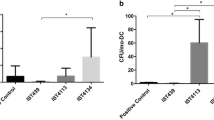Abstract
Pseudomonas aeruginosa mannose sensitive hamemagglutination strain (PA-MSHA) is a kind of peritrichous P. aeruginosa strain with MSHA fimbriae and has been shown to activate kinds of immunocytes. Dendritic cells (DCs) are specialized antigen-presenting cells required for the stimulating and priming CD4+ T cells toward the T helper cell type 1 (Th1), Th2 and other different phenotypes. PA-MSHA effecting on Th1 remains an important missing link. Here we demonstrated that PA-MSHA augmented monocytes derived-dendritic cells (Mo-DCs) expression of HLA-DR, co-stimulatory and adhesion molecules, and induced Th1-promoting interleukin-12 and tumor necrosis factor α secretion, in addition, PA-MSHA treated Mo-DCs displayed lesser endocytic capacity. Furthermore, in mixed lymphocyte reactions, allostimulatory capacity of Mo-DCs was enhanced by PA-MSHA, CD4+ T cells stimulated by PA-MSHA -activated Mo-DCs showed a Th1-polarized cytokine production, increasing secretion of IFN-γ and decreasing secretion of IL-10 and IL-4. Our findings identified PA-MSHA as an important exogenous factor that induced DCs maturation toward a Th1-promoting phenotype.





Similar content being viewed by others
References
Liu ZB, Hou YF, Min-Dong, Di GH, Wu J, Shen ZZ, Shao ZM (2009) PA-MSHA inhibits proliferation and induces apoptosis through the up-regulation and activation of caspases in the human breast cancer cell lines. J Cell Biochem 108:195–206
Jia L, Wang C, Kong H, Yang J, Li F, Lv S, Xu G (2007) Effect of PA-MSHA vaccine on plasma phospholipids metabolic profiling and the ratio of Th2/Th1 cells within immune organ of mouse IgA nephropathy. J Pharm Biomed Anal 43:646
Banchereau J, Steiman RM (1998) Dendritic cells and the control of immunity. Nature 392:245–252
D’elios M, Del Prete G (1998) Th1/Th2 balance in human disease. Transplant Proc. 30:2373–2377
Suzue K, Kobayashi S, Takeuchi T, Suzuki M, Koyasu S (2008) Critical role of dendritic cells in determining the Th1/Th2 balance upon Leishmania major infection. Int Immunol 20(3):337–343
Xu X, Wen X, Chi Y, He L, Zhou S, Wang X, Zhao J, Liu F, Su C (2010) Activation-induced T helper cell death contributes to Th1/Th2 polarization following murine Schistosoma japonicum infection. J Biomed Biotechnol 2010:202397
Kawakami K (1999) Factors for the onset of and the exacerbation of tuberculosis. 2. Host factors promoting the occurrence and exacerbation of tuberculosis: significance of Th1–Th2 cytokine balance. Kekkaku 74:735–740
Jebreel A, Mistry D, Loke D, Dunn G, Hough V, Oliver K, Stafford N, Greenman J (2007) Investigation of interleukin 10, 12 and 18 levels in patients with head and neck cancer. J Laryngol Otol 121:246–252
Hong S, Qian J, Yang J, Li H, Kwak LW, Yi Q (2008) Roles of idiotype-specific T cells in myeloma cell growth and survival: Th1 and CTL cells are tumoricidal while Th2 cells promote tumor growth. Cancer Res 68:8456–8464
Yang M, Ma C, Sun J, Shao Q, Gao W, Zhang Y, Li Z, Xie Q, Dong Z, Qu X (2008) Fucoidan stimulation induces a functional maturation of human monocyte-derived dendritic cells. Int Immunopharmacol 8:1754–1760
Benvenuti F, Lagaudrière-Gesbert C, Grandjean I, Jancic C, Hivroz C, Trautmann A, Lantz O, Amigorena S (2004) Dendritic cell maturation controls adhesion, synapse formation, and the duration of the interactions with naive T lymphocytes. J Immunol 172:292–301
O’Garra A (1998) Cytokines induce the development of functionally heterogeneous T helper cell subsets. Immunity 8:275–283
Weaver D, Poligone B, Bui T, Abdel-Motal U, Baldwin A, Tisch R (2001) Dendritic cells from nonobese diabetic mice exhibit a defect in NF-κB regulation due to a hyperactive IκB kinase. J Immunol 167:1461–1468
Ueno H, Klechevsky E, Morita R, Aspord C, Cao T, Matsui T, Di Pucchio T, Connolly J, Fay JW, Pascual V, Palucka AK, Banchereau J (2007) Dendritic cell subsets in health and disease. Immunol Rev 219:118–142
Steinman RM, Banchereau J (2007) Taking dendritic cells into medicine. Nature 449:419–426
Heufler C, Koch F, Stanzl U, Topar G, Wysocka M, Trinchieri G, Enk A, Steinman RM, Romani N, Schuler G (1996) Interleukin-12 is produced by dendritic cells and mediates T helper 1 development as well as interferon-gamma production by T helper 1 cells. Eur J Immunol 26:659–668
Merad Miriam, Manz Markus G (2009) Dendritic cell homeostasis. Blood 113:3418–3427
Mark Wallet A, Pradip Sen, Roland Tisch (2005) Immunoregulation of dendritic cells. Clin Med Res 3:166–175
Feili-Hariri M, Falkner DH, Morel (2005) Polarization of naive T cells into Th1 or Th2 by distinct cytokine-driven murine dendritic cell populations: implications for immunotherapy. J Leukoc Biol 78:656–664
Trinchieri G (1995) The two faces of interleukin 12: a pro-inflammatory cytokine and a key immunoregulatory molecule produced by antigen-presenting cells. Ciba Found Symp 195:203–214
Morel PA, Oriss TB (1998) Cross regulation between Th1 and Th2 cells. Crit Rev Immunol 18:275–303
Kanazawa M, Yoshihara K, Abe H, Iwadate M, Watanabe K, Suzuki S, Endoh Y, Takita K, Sekikawa K, Takenoshita S, Ogata T, Ohto H (2005) Effects of PSK on T and dendritic cells differentiation in gastric or colorectal cancer patients. Anticancer Res 25:443–449
Author information
Authors and Affiliations
Corresponding author
Rights and permissions
About this article
Cite this article
Zhang, Y., Wang, H., Li, Y. et al. The Pseudomonas aeruginosa Mannose Sensitive Hamemagglutination Strain (PA-MSHA) Induces a Th1-Polarizing Phenotype by Promoting Human Dendritic Cells Maturation. Indian J Microbiol 54, 163–169 (2014). https://doi.org/10.1007/s12088-013-0436-6
Received:
Accepted:
Published:
Issue Date:
DOI: https://doi.org/10.1007/s12088-013-0436-6




